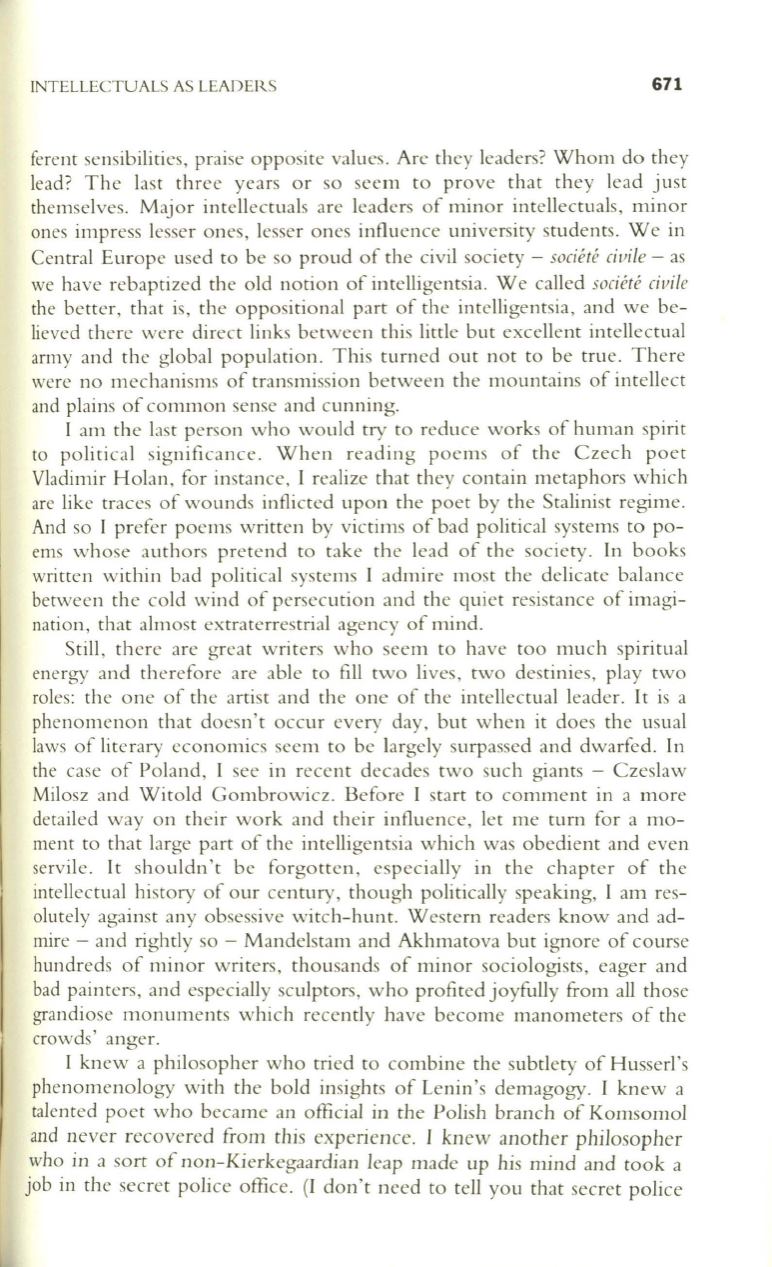
INTELLECTUALS AS LEADERS
671
ferent sensibilities, praise opposite values. Are they leaders? Whom do they
lead? The last three years or so seem to prove that they lead just
themselves. Major intellectuals are leaders of minor intellectuals, minor
ones impress lesser ones, lesser ones influence university students. We in
Central Europe used to be so proud of the civil society -
societe civile
-
as
we have rebaptized the old notion of intelligentsia. We called
societe civile
the better, that is, the oppositional part of the intelligentsia, and we be–
lieved there were direct links between this little but excellent intellectual
army and the global population. This turned out not to be true. There
were no mechanisms of transmission between the mountains of intellect
and plains of common sense and cunning.
I am the last person who would try to reduce works of human spirit
to political significance. When reading poems of the Czech poet
Vladimir Holan, for instance, I realize that they contain metaphors which
are like traces of wounds inflicted upon the poet by the Stalinist regime.
And so I prefer poems written by victims of bad political systems to po–
ems whose authors pretend to take the lead of the society. In books
written within bad political systems I admire most the delicate balance
between the cold wind of persecution and the quiet resistance of imagi–
nation, that almost extraterrestrial agency of mind.
Still, there are great writers who seem to have too much spiritual
energy and therefore are able to fill two lives, two destinies, play two
roles: the one of the artist and the one of the intellectual leader. It is a
phenomenon that doesn't occur every day, but when it does the usual
laws of literary economics seem to be largely surpassed and dwarfed. In
the case of Poland , I see in recent decades two such giants - Czeslaw
Milosz and Witold Gombrowicz. Before I start to comment in a more
detailed way on their work and their influence, let me turn for a mo–
ment to that large part of the intelligentsia which was obedient and even
servile. It shouldn't be forgotten, especially in the chapter of the
intellectual history of our century, though politically speaking, I am res–
olutely against any obsessive witch-hunt. Western readers know and ad–
mire - and rightly so - Mandelstam and Akhmatova but ignore of course
hundreds of minor writers, thousands of minor sociologists, eager and
bad painters, and especially sculptors, who profited joyfully from all those
grandiose monuments which recently have become manometers of the
crowds' anger.
I knew a philosopher who tried to combine the subtlety of Husserl's
phenomenology with the bold insights of Lenin's demagogy. I knew a
talented poet who became an official in the Polish branch of Komsomol
and never recovered from this experience. I knew another philosopher
who in a sort of non-Kierkegaardian leap made up his mind and took a
job in the secret
police
office.
(I
don't need to tell you that secret police


